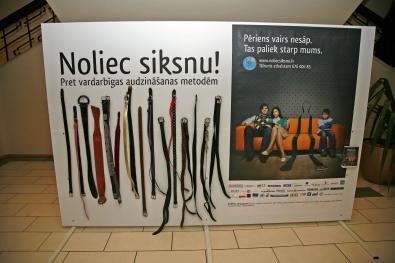In the beginning of 2009 a campaign
Put Your Belt Away has been started by
Center Dardedze together with partners - a campaign against corporal punishment of children. The aim of this campaign is to change the stereotype in Latvia that corporal punishment (belting, spanking, shaking etc.) is an appropriate and acceptable way of raising a child which doesn't affect the relationships among children and parents. The necessity had roused from the study made in 2005 which was made in co-operation with the study's of public opinion center SKDS.
The research
This research made by SKDS in October 2005 revealed that more than half of Latvia's inhabitants consider physical punishment as an appropriate and justifiable way of raising a child - 12% of the respondents pointed out that children abuse is a method that "can be used if parents consider it effective" and 45% replied that "it shouldn't be put into reality however there are cases when it is justifiable". The notion that "physical punishment for children shouldn't ever be used" was supported by 39% of respondents.
In November 2008 Center Dardedze conveyed a repeated research in co-operation with research agency Data Serviss. All together 1,003 people were surveyed - people that represent Latvia's society. The aim of the research was to find out the attitude against abuse of a child. Respondents were asked to assess how much they agree (agree completely, somewhat agree, somewhat disagree, disagree completely) to these statements:
1. Many people have been belted in the childhood but have grown as normal people;
2. Corporal punishment of children is allowed in some occasions;
3. Flogging or a slap can help to explain the difference to the child between good and right behavior;
4. Child abuse doesn't affect long term relationships among parents and children;
5. Child's physical punishment (slapping, belting) is an effective way of raising a child.
The foundation of these statements has been made from the general thought from the society that "we were all belted during childhood but we have grown up into normal people", "it is allowable to belt the child once in a while or he will not be a manageable child", "you can belt the child once so he or she understands that something is forbidden" etc.
After conveying the research it was found out that almost half (49%) of Latvia's inhabitants consider that "many people were all belted during childhood but have grown up into normal people". More than one third (37%) of inhabitants consider that "child's physical punishment is allowed in particular cases". 36% of respondents think that "a spank or belting can help to explain the difference to the child between good and bad behavior". 26% think that "abuse doesn't affect child to parent relationships in the long term". One fifth of the respondents (20%) admit that "physical child punishment is an effective way of raising a child".
It may be concluded that the fact of child abuse is often being approved by society and declared as a normal action which doesn't affect child's future but helps to explain the difference between good and bad behavior.
 |
|
The Index of Belt
Considering the alarming results from researches of 2005 and 2008, a necessity aroused for one measurement that would instantly monitor the changes in Latvia's inhabitant's attitude against physical children abuse. Along with starting the campaign Put Your Belt Away in January 2009, this measurement was named The Index of Belt. The basic of this index is a statement from research that was carried out in November 2008. The results of the research testify that there is a high correlation or connection between the statements that were included - a positive answer to one of the questions shows that the respondent most likely will have replied to all the rest of the questions affirmatively. Taking into consideration the high level of relation between these statements, it is possible to create an index that can help to measure the attitude against physical child's punishment better than each of these statements separately.
Index has been created in the scale from 0 to 100 points. If the index was 0, there would be a complete condemnation among Latvia's citizens against physical child punishment. Accordingly if the index was 100, all the citizens of Latvia would approve physical child's punishment.
In the beginning of 2009 the Index against Physical Child Punishment or The Index of Belt was 36.2. Considering that this kind of ratio has been created for the first time, it is not possible to compare the results with past years. It will be possible to compare and to evaluate the results after carrying out a repeated survey.
Even though it is not possible to look at the changes in time, it is possible to compare the results of index in different groups of Latvia's inhabitants. This kind of overview helps to understand better which group's opinions approve this kind of punishment the most and which - the least.
All together 30% of Latvia's inhabitants the Index of Belt are above 50, which points to the fact that these people consider physical punishment to a child acceptable. For more than 70% of respondents this index is below 50. From these facts it is possible to draw a conclusion that every third of Latvia's inhabitant considers child's physical punishment as acceptable!
Looking at different inhabitant groups, it can be said that the main demographical factors that affect the attitude of Latvia's inhabitants against child's abuse are: sex, age, place of living, education and number of children in the family. Those who accept child's physical punishment more are men, older people, those who live in the countryside and farms, people with elementary education and people without children.
Factors like language used in everyday life, level of income, profession and position don't have any relevant connection with the attitude against physical punishment towards children.
You can read more about the campaign at www.noliecsiksnu.lv





